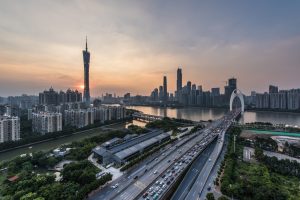A surge in COVID-19 cases has spurred lockdowns in the southern Chinese manufacturing hub of Guangzhou, adding to financial pressure that has disrupted global supply chains and sharply slowed growth in the world’s second-largest economy.
Residents in districts encompassing almost 5 million people have been ordered to stay home at least through Sunday, with one member of each family allowed out once per day to purchase necessities, local authorities said Wednesday.
The order came after the densely populated city of 13 million reported more than 2,500 new cases over the previous 24 hours. Public transport has been suspended and classes halted across much of Guangzhou, while flights to Beijing and other major cities have been canceled, according to state media.
China has retained its strict “zero-COVID” policy despite relatively low case numbers and no new deaths.
The country’s borders remain largely closed and internal travel and trade is fraught with ever-changing quarantine regulations.
The tight restrictions have sparked occasional clashes between residents and local Communist Party officials, who are threatened with punishment if reported cases in their areas of jurisdiction climb above levels deemed acceptable.
On Tuesday, police in northeastern China said that seven people have been arrested following a clash between residents and authorities enforcing COVID-19 quarantine restrictions. A news release from the police department in the Shandong city of Linyi said public security would take strong measures against those who “illegally violated the legal rights of personal protection of citizens.”
Anti-pandemic measures have prompted backlashes across the country, forming a rarely seen challenge to Communist Party authority. It wasn’t immediately clear who was arrested after the clash. News of the arrests appeared on social media Tuesday morning but were erased by the country’s censors before noon.
Chinese leader Xi Jinping has made “zero-COVID” a hallmark of his administration, which gained a boost last month after he was granted a third five-year term in power and promoted loyalists to top positions.
Those include the former party leader of Shanghai, where a draconian lockdown over the summer led to food shortages, confrontations with authorities, and severe disruptions to global supply chains that have grown dependent on Chinese manufacturing and shipping.
Last week, access to the industrial zone where a factory that manufactures Apple iPhones is located was suspended for one week following a surge in infections in Zhengzhou and the departure of workers from the factory. Many climbed fences and walked along highways to avoid being placed in quarantine centers where food, sanitation, and privacy standards have been heavily criticized.
Apple announced Sunday that customers will have to wait longer to get its latest iPhone models, saying the Foxconn factory in the central Chinese city Zhengzhou is “operating at significantly reduced capacity.”
Chinese leaders have dismissed calls from the United Nations’ World Health Organization to ease regulations, refused to import foreign vaccines, and defied requests to release more information about the source of the virus, which was first detected in the central Chinese city of Wuhan in late 2019.
While the rest of the world has mostly opened up, China has taken only highly cautious minor steps, with its borders still largely closed and officials under heavy pressure to enforce restrictions.
China reported its trade shrank in October as global demand weakened and anti-virus controls weighed on domestic consumer spending. Exports declined 0.3 percent from a year earlier, down from September’s 5.7 percent growth, the customs agency reported Monday. Imports fell 0.7 percent, compared with the previous month’s 0.3 percent expansion.
Speculation about a possible relaxation of “zero-COVID” roiled markets, but the government has kept its plans, including the possibility of importing foreign vaccines, a closely held secret.

































